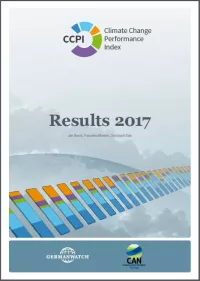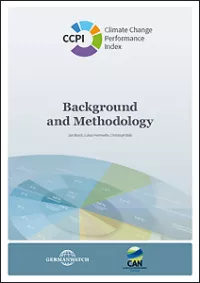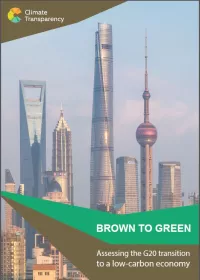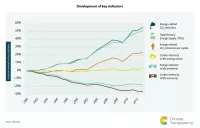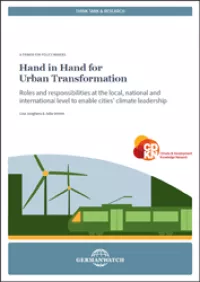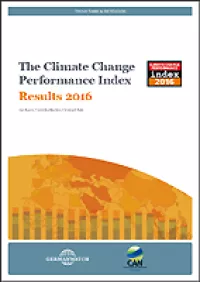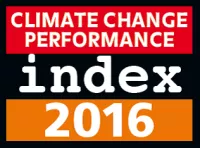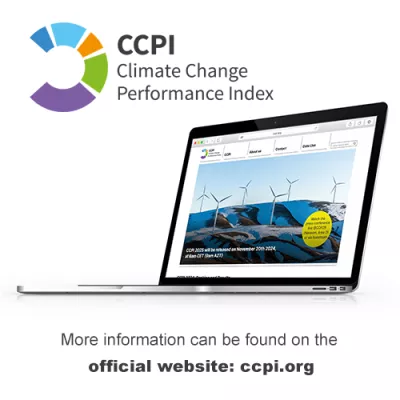Aktuelles zum Thema
News
How to raise ambition in climate action in G20 countries?
The Brown to Green Forum discussed with high-level representatives and experts from G20 countries how to increase ambition for climate action in the G20. It explored policy options, opportunities and new coalitions within the G20 and particularly discussed the role of the financial sector to drive the shift from fossil-fuel to low-carbon investments. Climate Transparency further presented a comparison of G20 countries’ climate action.
Publication
A comparison of the 58 top CO2 emitting nations
Under the Paris Agreement, climate action was anchored in the context of international law. This requires countries to make their own unique contribution to the prevention of dangerous climate change. The next crucial step to follow this agreement is the rapid implementation by the signing parties of concrete measures to make their individual contributions to the global goal. For the past 12 years, the Climate Change Performance Index (CCPI) has been keeping track of countries’ efforts in combating climate change. The varying initial positions, interests and strategies of the numerous countries make it difficult to distinguish their strengths and weaknesses and the CCPI has been an important tool in contributing to a clearer understanding of national and international climate policy.
Publication
The Climate Change Performance Index is an instrument designed to enhance transparency in international climate politics. Its aim is to put political and social pressure on those countries which have, up until now, failed to take ambitious action on climate protection. It also aims to highlight those countries with best prac-tice climate policies.
Publication
A Climate Transparency Report supported by Germanwatch
The report, “Brown to Green: Assessing the G20 transition to a low-carbon economy” has been produced by Climate Transparency, and written by a range of international experts and was launched at a press conference in Beijing. With climate change high on this year’s G20 agenda, along with green finance, the assessment looks at a range of indicators on climate action, including investment attractiveness, investment in renewable energy, climate policy, the carbon intensity of both the energy and electricity sectors of the G20 economies, of their fossil fuel subsidies and their contributions to climate finance.
Press Release
The G20 needs to make more effort to move to a green, low-carbon economy, especially in the areas of coal power expansion and climate policy, but is beginning to head in the right direction. This is the key result of a comprehensive assessment of G20 climate action, released in Beijing today ahead of the G20 summit in China this weekend. The report, “Brown to Green: Assessing the G20 transition to a low-carbon economy” has been produced by Climate Transparency, and written by a range of international experts and was launched at a press conference in Beijing.
Publication
Roles and responsibilities at the local, national and international level to enable cities’ climate leadership
The Paris Agreement which was adopted in December 2015 sets the pace for global action against climate change for the coming years and decades. In its preamble it underlines the importance of all levels of government engaging in and contributing to tackling the climate challenge. Given the significance of cities in emitting greenhouse gases as well as their vulnerability to the impacts of climate change, their role in advancing a low-carbon and climateresilient development should not be underestimated. An urban transformation is key as it will decisively shape the functionality of cities for the next 50 to 100 years.
Blogpost
Blog post by Vera Künzel and Alexander Reif, July 2016
The Nansen Initiative, which ended in 2015, developed a comprehensive "Protection Agenda” over the course of 3 years, which to date has been endorsed by over 100 countries. Although not producing new legal regulations, the initiative was pioneering in that it was the first intergovernmental process to work on protecting people displaced across borders by disasters and in the context of climate change. Its focus on exploring existing political instruments in order to close the protection gap has made for a solid foundation for further work. Now next steps are to be taken.
Blogpost
Post by Lisa Junghans, January 2016
Lisa Junghans, Policy Advisor – Climate Change, Adaptation and Urban Transformation at Germanwatch talks at the Climate & Development Knowledge Network- Website about a recent CDKN-supported publication on financing climate compatible development in cities. The publication is an output of CDKN supported project.
Publication
A comparison of the 58 top CO2 emitting nations
The Climate Change Performance Index is an instrument supposed to enhance transparency in international climate politics. Its aim is to encourage political and social pressure on those countries which have, up to now, failed to take ambitious actions on climate protection as well as to highlight countries with best-practice climate policies. On the basis of standardised criteria, the index evaluates and compares the climate protection performance of 58 countries that are, together, responsible for more than 90 percent of global energy-related CO2 emissions.
Press Release
Indications for a turning point, but not yet a steady trend / Australia, Japan and Korea worst performers of all industrialized countries - a Press Release Germanwatch and Climate Action Network (CAN) Europe
The millennium started with a lost decade in terms of climate protection and, as indicated in the eleventh edition of the Climate Change Performance Index (CCPI), global emissions were still growing in 2013. For 2014, there are signs of a slowdown or even a halt of this trend.


